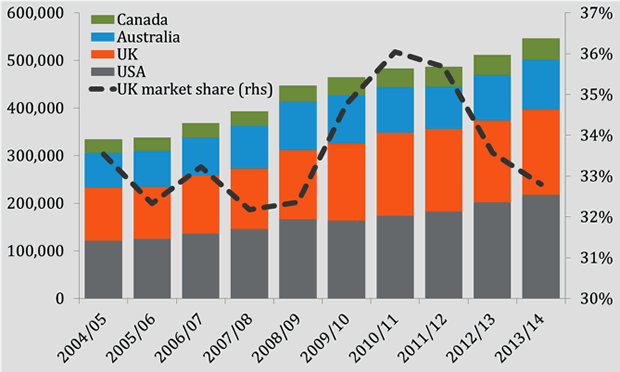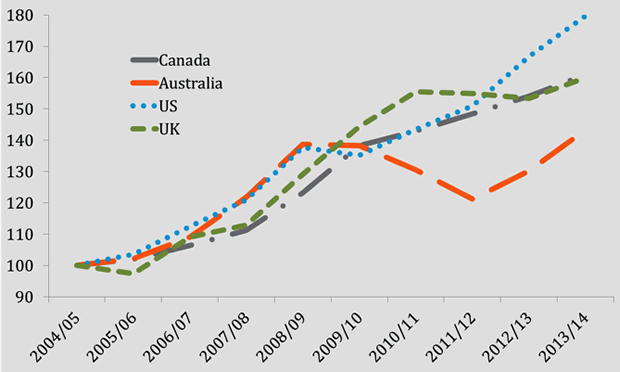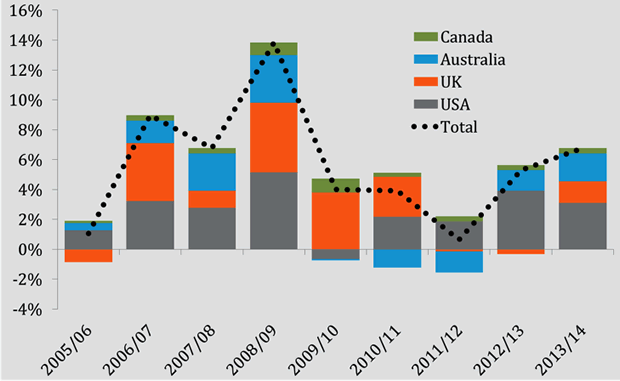You are here
Home ›25/02/2015
By the Numbers: UK competitiveness slips again. But all is not lost.
The good news for UK higher education is that the number of new international enrolments grew in 2013/14 for the first time in three years. The bad news is that the UK continues to lose market share to rival host destination countries, particularly Australia and the U.S. The UK’s market share among the four major host destination countries has fallen in each of the last three years, returning to levels last seen in 2008/09. More worrying, based on the latest UK study visa data from the Home Office, UK market share will likely decline further in 2014/15.
Taking the longer view, however, the UK’s overall competitiveness vis-à-vis the other major markets may have simply returned to its long-term equilibrium after the heady – and ultimately unsustainable – growth period from 2009 to 2011. In other words, perhaps the UK higher education sector overheated from 2009-11, in which case the recent three year decline in market share is a course correction rather than a sign of lagging competitiveness. After all, if the UK never enrols a larger share of international higher education students than it did in 2013/14, it will still account for one third of all new international enrolments in the major host destination countries.
New international HE enrolments and UK market share
Source: CIC, AEI, HESA, IIE; data represents new international HE enrolments, only non-EU enrolments reported for UK.
While Australia may garner more headlines these days given the strong growth in its new international enrolments over the last two years, it is the U.S. higher education sector which has outpaced all other major markets by a considerable margin since 2009, making the U.S. the greatest source of competition for the U.K. sector over the long term. This is doubly true as the U.S. now enrols nearly as many international students in higher education every year as the U.K. does even with E.U. students included, and undergraduate and postgraduate students generally enrol there for periods lasting at least one year longer than their counterparts in the U.K.
In fact, there were some 170,000 more international students enrolled in tertiary education in the U.S. than in the U.K. in 2012, according to the OECD, and the gap has almost surely grown since then. Thus in terms of total years that international students spend in their respective markets, the U.S. outperforms the U.K. by a larger margin than headline enrolment figures tend to express.
As for Australia, growth in international enrolments has admittedly outpaced all other major markets in the last year, but much of this is simply the Australian education sector climbing out of the hole it fell into from 2010-12. Indeed, total international enrolments in Australian higher education in 2014 essentially returned to levels last seen in 2009. It will take another couple years of double-digit growth before Australia even catches up with the total growth in Canada and the UK since 2004. What’s more, with recent concerns surrounding visa fraud in Australia, it appears likely that 2015 will see slower growth rates in new international enrolments than Australia has enjoyed over the last two years.
Neck and neck: Total per cent change in new higher education enrolments, 2004/05 = 100
Source: CIC, AEI, IIE, HESA, British Council SIEM; data represents total per cent change in new international higher education enrolments since 2004/05.
On the whole, international demand for higher education in the major host markets has grown every year since at least 2005, but the sources of growth have changed. Canada is the only country to have contributed net growth in every year, but it remains a marginal player overall, with market share remaining a constant eight per cent for every year over the last decade. Australia is the Jekyll-and-Hyde story of international education, registering the deepest annual declines of any country over the last decade in 2011 and 2012, only tocome roaring back in 2013 and 2014. Meanwhile, the U.S. has recorded positive growth in every year except for one, and contributed more to the overall growth in international enrolments in six of the last nine years, but it has managed to do so relatively quietly.
As for the UK, new international enrolments in UK higher education first fell in 2011/12, but the overall growth in new international enrolments in other markets also dropped to almost zero over this period. In 2012/13, however, only the U.K. sector declined while the other three major markets recorded relatively strong growth. This suggests that some internal shock explains the weakening competitiveness of the UK’s offer in 2012/13, rather than an external drop in demand for international education. That the UK higher education sector returned to growth in 2013/14 is therefore cause for cautious optimism, but it remains unclear whether this growth was a result of favourable policy changes in the UK offer or simply the result of a rising tide lifting all boats.
Per cent contribution of major host destination markets to new international HE enrolments
Source: CIC, AEI, HESA, IIE; data represents annual per cent change in new international enrolments, but only non-EU international enrolments are shown for the UK.
Only time will tell if the UK’s 4.3 per cent growth rate in new international enrolments in 2013/14 means that the UK higher education sector has gotten its mojo back, so to speak. But judging by the higher growth rates recorded in Australia (more than 10 percent) and the U.S. (nearly eight per cent) over this period – as well as the anaemic growth in demand for UK study visas in 2014 – the UK may not be out of the woods quite yet.
British Council’s Services for International Education Marketing (SIEM) team helps UK institutions refine their internationalisation strategies to succeed in East Asia and around the globe. Please get in touch if you would like to learn more.
Jeremy Chan
Head of Research and Consultancy, SIEM East Asia
jeremy.chan@britishcouncil.org.cn






